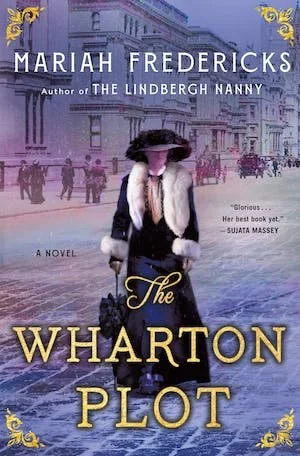The Wharton Plot by Mariah Fredericks
/The Wharton Plot
By Mariah Fredericks
Minotaur Books 2024
At the beginning of The Wharton Plot, Mariah Fredericks’ follow-up to her 2022 book-club favorite The Lindbergh Nanny, the famous novelist Edith Wharton is meeting with her Scribner’s publisher in the tea room of an opulent 1911 New York hotel. It’s a tense meeting; Mrs. Wharton is known to be a sharp-tongued and imperious author, and her most recent book, The Fruit of the Tree, hasn’t performed well for Scribner’s. The house wants her to return to the métier that had made breakout book The House of Mirth such a hit five years earlier: old money and “the 400” of Gilded Age New York, and she in turn accuses Scribner’s of doing a lousy job advertising her book.
So it’s no wonder that her poor publisher is soon looking for any distraction to cut the tension. Fortunately, right at that moment appears the flamboyant novelist David Graham Phillips, bestselling author of muckraking novels that couldn’t be more antithetical to the fiction Mrs. Wharton produces. It quickly becomes apparent that the man himself is no more compatible – the two writers hate each other immediately, although even while they’re trading polite barbs, Fredericks works in touching flashes of vulnerability on both their parts. Mrs. Wharton might leave their meeting easily vilifying Phillips, but she can’t shake his scathing comments about her elite world (and, by easy extension, what he sees as her antiquated fiction).
It’s therefore an inordinate shock to her when, soon after their meeting, Phillips is shot dead just outside of city’s famously exclusive Gramercy Park. Fredericks indulges in the classic psychological murder mysteries of having the doomed Phillips glimpse his killer and think But I know you before dying, so both the reader and Edith Wharton are equally compelled to learn the identity of the killer – Mrs. Wharton all the more when she learns that Phillips had been receiving cryptic threatening notes for some time.
The notes hadn’t bothered Phillips. He was accustomed to being controversial, and he’s certain his forthcoming novel Susan Lenox, currently prepping for publication at Scribner’s rival Appleton, will be his most explosive work of all. Mrs. Wharton goes to Appleton’s offices, where she meets publisher Rutger Bleecker Jewett (wonderfully making what is surely his first appearance in a work of fiction?) and reads enough of the book in draft to dismiss it as tedious and overwritten. But she can’t stop wondering about the killer.
Fredericks does a smooth, hugely confident job of drawing the reader into Edith Wharton’s complicated world at this point in her life. She and her overwrought husband Teddy are only in the United States to sell some property (and wrangle with her publisher) before returning to Europe; during this interval, Mrs. Wharton is making the rounds of social calls among the moneyed elite (at one of these gatherings, Senator Chauncey Depew flatly tells her, “People don’t care about books”), trying to deal with her husband’s unstable mental state, and cautiously hoping to avoid open scandal regarding the other man in her life, Morton Fullerton. Her growing obsession with cracking the mystery of this murder overtakes all of these complications, but the complications themselves are so well drawn that readers will feel completely enmeshed in this world.
Fredericks has a good deal of obvious fun pulling in other figures from that world. Edith Wharton herself is marvelously portrayed as a famous writer gnawed by doubts but doggedly, often hilariously pompous (“the woman was self-deprecating and deferential,” goes one passage, “two qualities that endeared her to Edith straightaway”). When she starts to think the killer must have been a jealous writer, she briefly wonders if her friend Henry James might be a suspect, noting with a winning lack of self awareness that “there had always been resentment on his part over the fact that her books sold better than his.” And surely the book’s most delightfully unexpected shout-out is to none other than the great mystery author Mary Roberts Rinehart: “Given the nature of the crime, it made sense to put the matter before a fellow author,” Mrs. Wharton reflects while waiting impatiently for a long-distance phone call to go through. “In America, there was no crime writer more celebrated than Mary Roberts Rinehart.” When Rinehart gives her the banal common sense advice of letting the police handle things, Mrs. Wharton’s petulant impatience virtually crackles off the page.
Two questions form the blades of the scissors that can cut apart any work of historical fiction: does the book work as fiction? - and does the book work as history? Is the novel’s Lorenzo the Magnificent believable as history’s Lorenzo the Magnificent? And: is the novel dramatically effective even if Lorenzo the Magnificent is subbed out for Lorenzo the Average? If an author is forced to resort to elbowing the reader in the ribs from time to time and saying, “Look, it’s Lorenzo the Magnificent, huh?” – well, that author is clearly expecting Lorenzo to do some of the work of carrying the book, and as contradictory as it might seem, that’s a failure of historical fiction, not a success.
The Wharton Plot escapes these blades completely. Thankfully, this is not “Edith Wharton, amateur sleuth” – rather, it’s a few tangled, affecting days in a busy author’s life, a startling incident between European sojourns, fittingly insightful and epigrammatic, considering its subject.
Steve Donoghue is a founding editor of Open Letters Monthly. His book criticism has appeared in The Washington Post, The American Conservative, The Spectator, The Wall Street Journal, The National, and the Daily Star. He has written regularly for The Boston Globe, the Vineyard Gazette, and the Christian Science Monitor and is the Books editor of Georgia’s Big Canoe News
